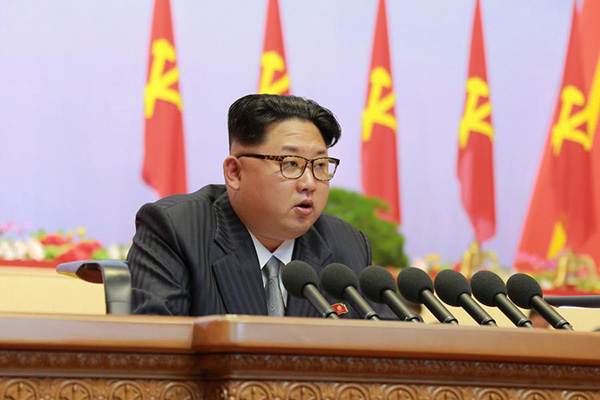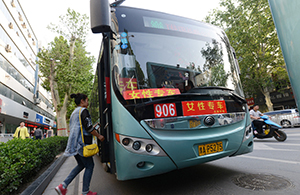Kim will find it hard to pursue twin goals at once
(China Daily) Updated: 2016-05-11 07:32
 |
|
DPRK's leader Kim Jong-un speaks during the first congress of the country's ruling Workers' Party in 36 years, in this photo released by North Korea's Korean Central News Agency (KCNA) in Pyongyang, May 6, 2016. [Photo/Agencies] |
Besides officially crowning Kim Jong-un as supreme leader, the just-concluded party congress of the Democratic People's Republic of Korea offered the rest of the world a rare glimpse of the country's actual policy orientations.
In contrast to the past months of harsh, sometimes intimidating, rhetoric regarding its pursuit of nuclear weapons and relations with Seoul and Washington, Pyongyang sounded impressively less-aggressive, even reconciliatory at the congress.
But Kim's assertion that the DPRK is a "responsible nuclear state" may ring hollow outside Pyongyang, because, suspicions about its nuclear capabilities aside, few would embrace it as a responsible nuclear power.
If Pyongyang is sincere about denuclearization, the best way to demonstrate it would be to stop its nuclear brinkmanship.
However, Kim just ruled that out.
He promised not to use nuclear weapons first unless threatened; yet Pyongyang feels under constant threat.
Kim did extend olive branches to both Seoul and Washington by stressing the need for talks to ease cross-border animosities, and reiterating Pyongyang's longstanding formula of reunification under a "federal system". He even announced his readiness to befriend hostile countries.
And in a move that seems like a break from his father's songun, or military first, strategy and one which inspires hope that he will switch his focus to the economy, Kim announced North Korea's first five-year economic plan since the 1980s and vowed to improve living standards in the country.
He pledged to boost the power supply, agriculture, and light manufacturing. He even identified the needs of increasing international trade and engagement with the global economy.
However, byongjin as the new key word of North Korean national policies indicates economic development and nuclear capabilities are two parallel goals that appear to carry equal weight on Kim's agenda.
This is where the trouble arises.
Byongjin does signify a step forward from songun, as it indicates Kim has finally come to terms with North Korea's grim economic reality and is showing he has the political will to handle it. But it is simply beyond Pyongyang's competence to pursue the twin goals at once. The country's limited resources can't support both. Nor will the international community allow its nuclearization.
Kim has seen the need to make peace with and engage the outside world in order to save his country's suffering economy.
But he appears unaware that his nuclear ambitions are poison for his country's economy. They will not only exhaust his country's very limited resources, but will further isolate his country from the rest of the world, politically and economically.

I’ve lived in China for quite a considerable time including my graduate school years, travelled and worked in a few cities and still choose my destination taking into consideration the density of smog or PM2.5 particulate matter in the region.











